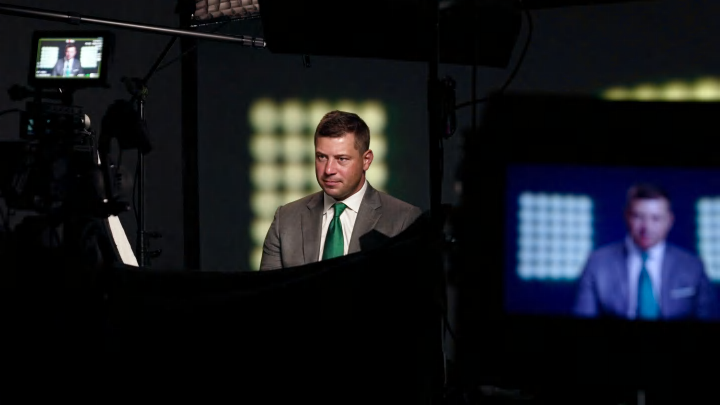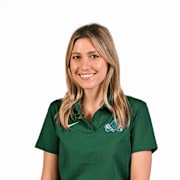Exclusive: Tulane Coach Jon Sumrall Shaped by His Mentors

Although Tulane kicks off fall camp with a lot of questions on the roster, coach Jon Sumrall is focused on building a culture centered on people.
His approach to the program has led to an offseason filled with unparalleled momentum and excitement for the Green Wave.
The first event for the new era, the Women’s Football Clinic, had an unbelievable turnout; as the emcee, I was blown away. The buy-in from the women in the fanbase highlights the excitement for this team under Sumrall.
It was also a very human event, one that highlighted the wives and silent heroes behind the program’s leaders.
In that way, it was the perfect inaugural event for the culture Sumrall wants to promote. One that he acknowledges wouldn’t have been the same without the people who shaped him.
Jon Sumrall sat down with Tulane on Sports Illustrated to share the journey he took from player to head coach of the Green Wave, and how his mentors helped him write his philosophy.
Every head coach starts somewhere, and the first step is realizing that goal. For Jon Sumrall, that itch was scratched while he was still a player.
“It starts with my college coach my last two years, and who I got my start coaching for,” Sumrall shared. “His name is Rich Brooks; the field at Oregon was named after him. He was Oregon's head coach from 1977 to 1994; his last year was the Rose Bowl season. Rich then became the head coach of the Rams, defensive coordinator of the Falcons, and eventually who I got my start in coaching with.”
Sumrall suffered a career-ending injury as a Kentucky linebacker, and he got his start under Brooks in 2005 as a graduate assistant for the Wildcats.
“Rich is retired now,” Sumrall continued. “He’s 82, still plays golf, an avid fisherman. He was down in New Orleans a couple months ago, so I got to see him and his wife. They were instrumental in helping me get into coaching. Rich and my high school coach, Ronny Massey, both made me know I wanted to be a coach.”
Sumrall’s journey led him to stints in San Diego, and one crucial to where he is today: co-defensive coordinator at Tulane from 2012-14. His next opportunity and learning lesson were at Troy.
“In regard to how I do everything daily now, I would say that’s Neal Brown,” Sumrall told me. "I worked under him at Troy, and now he's the head coach at West Virginia. He’s a dear friend; I see him every summer at the beach. My wife and I go to the same place about a half a mile apart from Neal and Brooke, and we always connect.”
“If I ever have a question, he’s always there. He’s been a great friend and ally. I learned so much about attention to detail, being thorough, and the analytics of the game from Neal.”
Coach Sumrall credits Matt Luke, who he worked under at Ole Miss, for what he learned about recruiting. But for the violent sport of football, it’s all about the people.
“Mark Stoops, from him I learned a ton about—man, everybody’s a person,” Sumrall said. “Mark has such a special way about him and getting to know the people that are in the building. Yeah, the scoreboard matters. We're all judged by the scoreboard in some ways, and that matters. But the people component, the relational component, you need to enjoy the process of what you do.”
Sumrall aptly pointed out how when you’re a kid, you don’t grow up saying I’m going to go work in football today. They want to play football. He takes his players' dreams seriously, and he credits Stoops for his understanding of human elements.
“I’ll get emotional, but I don’t love what the job gives me. I love being able to be around the guys daily.”
“This game has given me so much. When I went to go work for Mark, I feel like I got my doctorate in coaching. I was fully polished and ready to be a head coach. If I'd done it before going to work for Mark, I probably would've been too process-driven, too results-oriented,” Sumrall admitted.
“Mark really humanized how you deal with everybody in the program and that you come in contact with, and that they all have a story. If you don’t listen to somebody’s story, you can’t help them be their best. Going to work for Mark helped me fully get to that place where I was like, okay, I’m ready to be a head coach.”
It’s clear that the mentors Sumrall encountered throughout his coaching journey share the character of the players and this program.
While apologizing for getting emotional, all I could think was how lucky the players are at Tulane to have a head coach who cares about them so deeply in just his first season leading the team.
